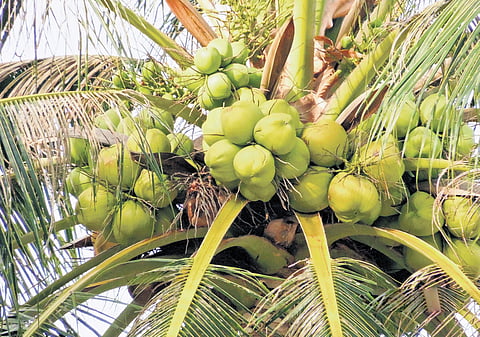

KOCHI: It seems the coconut farming sector in South India has been hit by what can be termed as a paradox of prosperity. While the price of coconut has skyrocketed, a shroud of melancholy has enveloped the sector in Kerala -- with farmers in distress over a steep decline in production. The price of coconut has touched Rs 80 per kg in the local market while coconut oil is selling for over Rs 400 a litre.
Mill owners and manufacturers are in crisis due to scarcity of nuts and exporters have taken huge losses, unable to balance purchase and market prices.
“We procure coconut from both Kerala and Tamil Nadu. There has been a steep decline in productivity, which has triggered scarcity in the market. Our export volumes have taken a beating and we have rescheduled work shifts at the factory due to non availability of coconut. We are unable to increase the price in the export market as that will affect our pricing advantage,” said the owner of a leading export firm.
According to experts, multiple factors have contributed to the crisis.
Small and marginal farmers have stopped manuring, harvesting and cleaning the crown of coconut trees in recent years due to low procurement rates and high fertiliser prices. Moreover, coconut climbers charge Rs 70-100 per tree, which growers say is proving unaffordable.
“There has been a decline in productivity due to climate change, relative humidity and scant rainfall. Despite productivity enhancement programmes, the area under cultivation is declining in Kerala. The Coconut Development Board (CDB) spends Rs 20 crore a year in Kerala on productivity enhancement initiatives.
Around 38% of coconut farms in Kerala are old and senile and farmers complain of pests and diseases. Though we have trained 33,000 people in Kerala over the past decade, there is shortage of climbers in the state,” said CDB chief coconut development officer B Hanumanthe Gowda.
“Productivity has declined from 50 nuts to 10-15 nuts per tree in recent years. Coconut tree climbers charge Rs 70-100 per tree, which is costly. Nowadays farmers employ workers from Tamil Nadu who use harvesting poles,” said Pandiyode Prabhakaran, a farmer in Palakkad.
The diversification of coconut-based industries has also contributed to the scarcity of coconuts. There are around 800 units in Kerala that produce a variety of products ranging from coconut oil, desiccated coconut, coconut milk, coconut milk powder, chips, tender coconut water, nata de coco, jaggery, squash, cookies, crunches, coconut shell powder, shell charcoal and activated carbon.
“Almost all units producing desiccated coconut procure nuts from Kerala. Export volumes increased by 25% in 2024-25 from the previous year. The country exported coconut products worth just over Rs 4,349 crore in 2024-25, of which products worth Rs 1,031.6 crore were shipped through Kochi port. Activated carbon constitutes around 63% of exports and there is huge demand for the product in countries like the United States.
The price of the coconut shell has gone up from Rs 8 to Rs 30 per kg due to demand. Exports to the UAE have recorded a steep increase after the free trade agreement. Products worth Rs 636 crore were exported to the Emirates in 2024-25,” a CDB official said.